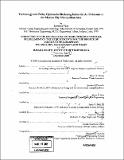Technology and policy options for reducing industrial air pollutants in the Mexico City Metropolitan Area
Author(s)
Vijay, Samudra, 1968-
DownloadFull printable version (13.81Mb)
Other Contributors
Massachusetts Institute of Technology. Technology, Management, and Policy Program.
Advisor
Mario M. Molina and Stephen R. Connors.
Terms of use
Metadata
Show full item recordAbstract
Technology plays an important role in dealing with air pollution and other environmental problems faced by developing and developed societies. This research examines if technological solutions alone, such as end-of-pipe and process control technologies, can achieve substantial and sustained emissions reduction from the industrial sector in the Mexico City Metropolitan Area (MCMA). Environmental standards for most of the criteria pollutants have frequently been violated in the MCMA. Severe air pollution in the MCMA, and the roles of point and area sources, particularly industrial sector, are the prime motivating factors for this research. Industrial sources of air pollution play a significant role in aggravating the air pollution problem in the MCMA. This research focuses on a 25-year horizon for socio-economic growth of the MCMA, and its implications on industrial energy demand, and pollutant emissions. I develop a simulation model to estimate industrial energy demand and emissions from the MCMA industrial sector. The model incorporates industrial growth rate, changes in the structure of industry and energy intensity, pollution control technologies, fuel-switching, technological progress, etc. I find that the level of industrial activity, driven by the macroeconomic environment, plays a significant role in shaping the long-term industrial air-pollution trajectory in the MCMA. I use two cost measures for evaluating cost-effectiveness of various strategies. First, the direct cost, which includes capital, operation & maintenance cost. Second, the policy cost includes direct cost and the cost of foregone production due to policy of deindustrialization. (cont.) Performance of a strategy is highly dependent on which measure of cost is chosen for the decision-making process. The abatement strategies which look attractive when only capital cost of the control technologies and investment in renewal of the production stock is considered, are no longer preferred when the policy cost is used. When only direct cost is considered, deindustrialization dominates the list of cost- effective options. However, when total policy cost of options is considered, reducing the structure adjusted energy intensity (SAEI) emerges as most dominant option. Further, I use a sectoral abatement approach to look at.the cost-effectiveness and estimate the potential cost savings from market-based regulatory instruments in achieving emission reductions. I find that the savings from using flexible, market-based mechanisms are large enough to warrant a serious consideration in environmental policymaking to achieve air-pollution abatement goals. On basis of the scenario analysis, I conclude that technology options alone are not sufficient to meet the industrial air pollution abatement goals in the MCMA. However, an aggressive implementation of technology and policy options can result in achieving sustained and substantial emissions reduction. The structural shift from high energy intensity industries to low energy intensity industries, and deindustrialization, moving the industrial activity away from the MCMA, should form an integral part of the policy making process. The current institutional framework in the MCMA to manage the environment is not geared to integrate the technology and policy options. (cont.) A paradigm shift -- from environmental policymaking for industrial sector to industrial-environmental policymaking -- is needed for attaining substantial and sustained emissions reduction, so that policy options such as deindustrialization and structural shift can be incorporated in the environmental policy making for the industrial sector.
Description
Thesis (Ph. D.)--Massachusetts Institute of Technology, Engineering Systems Division, Technology, Management, and Policy Program, February 2005. Includes bibliographical references (p. 227-239).
Date issued
2005Department
Massachusetts Institute of Technology. Engineering Systems Division; Technology and Policy ProgramPublisher
Massachusetts Institute of Technology
Keywords
Technology, Management, and Policy Program.